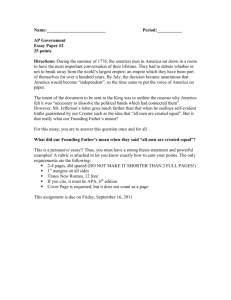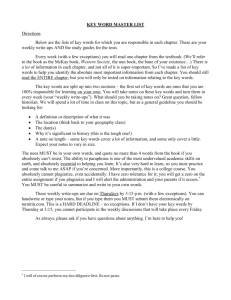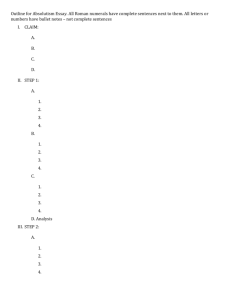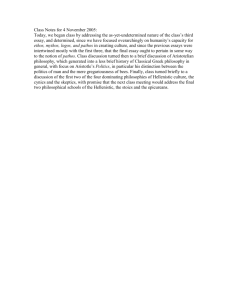Key word chapter guides FA15
advertisement
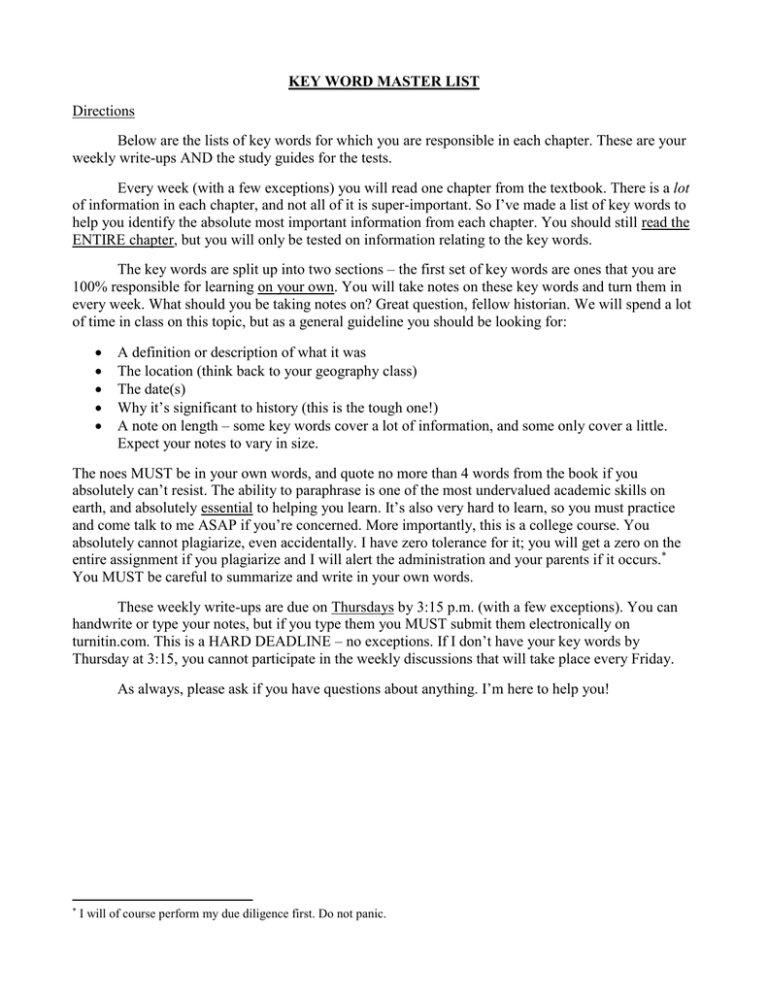
KEY WORD MASTER LIST Directions Below are the lists of key words for which you are responsible in each chapter. These are your weekly write-ups AND the study guides for the tests. Every week (with a few exceptions) you will read one chapter from the textbook. There is a lot of information in each chapter, and not all of it is super-important. So I’ve made a list of key words to help you identify the absolute most important information from each chapter. You should still read the ENTIRE chapter, but you will only be tested on information relating to the key words. The key words are split up into two sections – the first set of key words are ones that you are 100% responsible for learning on your own. You will take notes on these key words and turn them in every week. What should you be taking notes on? Great question, fellow historian. We will spend a lot of time in class on this topic, but as a general guideline you should be looking for: A definition or description of what it was The location (think back to your geography class) The date(s) Why it’s significant to history (this is the tough one!) A note on length – some key words cover a lot of information, and some only cover a little. Expect your notes to vary in size. The noes MUST be in your own words, and quote no more than 4 words from the book if you absolutely can’t resist. The ability to paraphrase is one of the most undervalued academic skills on earth, and absolutely essential to helping you learn. It’s also very hard to learn, so you must practice and come talk to me ASAP if you’re concerned. More importantly, this is a college course. You absolutely cannot plagiarize, even accidentally. I have zero tolerance for it; you will get a zero on the entire assignment if you plagiarize and I will alert the administration and your parents if it occurs.* You MUST be careful to summarize and write in your own words. These weekly write-ups are due on Thursdays by 3:15 p.m. (with a few exceptions). You can handwrite or type your notes, but if you type them you MUST submit them electronically on turnitin.com. This is a HARD DEADLINE – no exceptions. If I don’t have your key words by Thursday at 3:15, you cannot participate in the weekly discussions that will take place every Friday. As always, please ask if you have questions about anything. I’m here to help you! * I will of course perform my due diligence first. Do not panic. Chapter 1 – Origins 1. The West 2. Sumerian social order 3. Patriarchy (Patriarchal system) 4. Babylonians 5. Egypt’s Old Kingdom 6. Bronze Age 7. New Kingdom of Egypt 8. Akhenaten and Nefertiti 9. Indo-European 10. Hittites 11. Sea Peoples Key Words Covered in Class 12. Neolithic Period 13. Stonehenge 14. Tigris & Euphrates Rivers 15. Hammurabi/Hammurabi’s Code 16. Mesopotamia 17. Cuneiform 18. Mesopotamian religion 19. The Nile 20. “Pharaoh” Potential Essay Question 1. How important was the local environment to the development of different civilizations? You must discuss at least THREE civilizations in your answer. Chapter 2 – Small Kingdoms and Mighty Empires in the Near East 2. 3. 4. 5. 6. 7. 8. Egypt’s Third Intermediate Period The Phoenicians Jerusalem Israel and Judah Daily Hebrew life Chaldeans/Neo-Babylonians Cyrus the Great Key Words Covered in Class 9. Moses & Egypt 10. Solomon 11. Assyrian military 12. Babylonian Captivity 13. Yahweh and the Covenant 14. Persian Royal Road 15. Zoroaster/Zoroastrianism Potential Essay Question 1. Do the ancient Hebrews qualify as their own unique civilization, separate from their neighbors? You will want to compare/contrast them to other civilizations in your answer. Chapter 3 – The Development of Classical Greece 2. “Linear A” and “Linear B” 3. The Minoans 4. Solon & Cleisthenes 5. Pericles 6. The Persian Wars 7. The Delian League 8. Spartan Women v. Athenian Women 9. Hippocrates 10. Philip II Key Words Covered in Class 11. The Mycenaeans 12. The “Dark Age” of Greece 13. Homer 14. Hesiod 15. “Polis” 16. Lycurgan regimen/system 17. The Peloponnesian War 18. Sophocles 19. Pre-Socratics 20. Hippocrates 21. Socrates 22. Plato 23. Aristotle Potential Essay Question 1. Compare and contrast the Spartan and Athenian political and social systems. In your opinion, which polis had a greater impact on Western civilization? Chapter 4 – The Hellenistic World Note: This chapter talks about the Hellenistic world mostly in general. That means you need to pay particular attention to finding important information and summarizing it. You don’t need to summarize everything about Hellenistic cities, for example, but you should make sure that you summarize enough information to describe what Hellenistic cities shared in common. 1. 2. 3. 4. 5. 6. 7. 8. Hellenistic cities Hellenistic agriculture Mystery religions Great Silk Road Hellenistic Jews Euclid Archimedes Empiric school of medicine Key Words Covered in Class 9. Alexander the Great 10. Hellenistic Period 11. Ptolemaic Kingdom 12. Seleucid Kingdom 13. Overland & seaborne trade patterns 14. Epicureanism 15. Stoicism Potential Essay Question 1. What was the most important legacy of Alexander’s empire? Chapter 5 – The Rise of Rome 1. The Gauls 2. Struggle of the Orders 3. Pyrrhus 4. Carthage 5. Second Punic War 6. Roman Daily Life 7. Paterfamilias 8. Octavian Augustus 9. Cleopatra 10. 31 BCE Key Words Covered in Class 1. Geography of Italy 2. The Etruscans 3. Romulus & Remus 4. Romanization of Italy 5. Patricians 11. Plebians 12. Tiberius Gracchus 13. Sulla 14. First Triumvirate 15. Julius Caesar Potential Essay Question 1. Compare the early Roman Empire to the empire conquered by Alexander the Great. Why did the Roman Empire hold together so much longer than Alexander’s? Chapter 6 – The Pax Romana 1. 2. 3. 4. 5. 6. 7. 8. 9. Roman Expansion Augustus Barbarians Virgil Ovid Pagan religion Tertullian of Carthage Barracks Emperors Crisis of the Third Century Key Words Covered in Class 1. Pax Romana 2. Augustus 3. Principate 4. Tiberius 5. Caligula 6. Claudius 7. Nero 8. Five Good Emperors 9. Hadrian 10. Life In Rome 11. Jesus 12. Paul of Tarsus 13. Peter Potential Essay Question 1. One of the most important events that occurred during the time of the Roman Empire was the birth of Christianity. Describe the evolution of Christianity. How do historians explain its early success? Chapter 7 – Late Antiquity 1. Diocletian 2. Constantine (politics/Empire) 3. The Tetrarchy 4. Tenant farmers 5. Theodosius v. Ambrose 6. Comitatus 7. Wergeld 8. The Celts 9. Battle of Adrianople 10. The Franks & Clovis 11. Saint Martin of Tours & Saint Patrick Key Words Covered in Class 1. Constantine (religion) 2. Saint Jerome 3. 312 CE 4. Council of Nicaea (325 CE) 5. The Petrine Doctrine 6. Eremitical (ascetic) monasticism 7. Benedict of Nursia 8. Women in early Christianity 9. Saint Augustine 10. “Barbarians at the Gate” v. “Barbarians inside the gate” theory 11. The Byzantine Empire 12. Justinian 13. Orthodox church Potential Essay Question 1. Did the Roman Empire “fall” or did it “shift” to another location? What forces caused it to either move or shift? Chapter 8 – Europe in the Early Middle Ages 1. Moorish (Muslim) Spain 2. al-Khawarizmi 3. Battle of Poitiers 4. Charlemagne 5. Carolingian miniscule 6. Saint Hilda 7. Beowulf 8. Viking attacks 9. Kievan Rus 10. Magyars Key Words Covered in Class 1. Muhammad 2. Ka’ba 3. Qur’an 4. Five Pillars of Islam 5. Sunni v. Shi’a 6. Dhimmi 7. Merovingian Dynasty 8. Carolingians 9. 800 CE 10. Treaty of Verdun 11. Feudalism 12. Manorialism 13. Serfs Potential Essay Question 1. With the collapse (or shift) of the Roman Empire, Europe became an easy target for foreign invasions. Describe the various assaults on Western Europe. What impact did the invasions have on medieval Europe? Chapter 9 – State and Church in the High Middle Ages 1. Primogeniture 2. Philip Augustus 3. Holy Roman Empire 4. Frederick Barbarossa 5. Reconquista 6. Parlement of Paris 7. Gregory VII 8. Gregory v. Henry IV 9. Innocent III 10. Knights Templars 11. Albigen sians 12. Christendom Key Words Covered in Class 1. 1066 2. William the Conqueror 3. Domesday Book 4. Eleanor of Aquitaine 5. Common law 6. Henry II v. Thomas Becket 7. Magna Carta 8. Île-de-France 9. Urban II 10. First Crusade 11. Saladin Potential Essay Question 1. The relationship between church and state in Europe throughout the Middle Ages was complicated. In what ways did the political revival of secular monarchies affect the church, and how did church reform efforts affect the secular monarchies? Which benefited most, the church or the secular rulers? Chapter 10 – The Life of the People in the High Middle Ages 1. 2. 3. 4. 5. 6. 7. New tech in medieval agriculture Oblates Hagiographies Fourth Lateran Council Jewish daily life Purgatory Religious orders Key Words Covered in Class 1. 2. 3. 4. 5. 6. 7. 8. 9. The Three Orders Open-field system Peasants and the legal system Feudal burden Chivalry Cistercians Daily life in monasteries Life for noble men Life for noble women Potential Essay Question 1. “In the society of the High Middle Ages, function determined social classification.” Discuss this statement in terms of those who worked, those who prayed, and those who fought. Does it adequately describe the reality of society at that time? Why or why not? Chapter 11 – Creativity and Challenges of Medieval Cities 1. 2. 3. 4. 5. 6. 7. 8. 9. Daily life in cities Popular entertainment Talmud study Thomas Aquinas Vernacular literature Troubadours Gothic architecture Inquisition Boniface VIII Key Words Covered in Class 1. Commercial Revolution 2. Burgher (or bourgeois) 3. Liberties 4. Merchant & craft guilds 5. Consequences of long-distance trade 6. Hanseatic League 7. Scholasticism/scholastics 8. University of Bologna’s law school 9. Bodily humors 10. Peter Abelard and Heloise 11. Thomas Aquinas 12. Dominicans 13. Franciscans Potential Essay Question 1. Describe and assess the impact of the emergence of towns during the High Middle Ages on European society and the economy, the church, and the state. Upon which of those three segments of society did the emergence of towns have the most impact? Chapter 12 – The Crisis of the Later Middle Ages 1. 2. 3. 4. 5. 6. 7. 8. 9. “Little ice age” Cannon Representative assemblies Jacquerie & English Peasants’ Revolt Prostitution & rape in the late Middle Ages Homosexuality in the late Middle Ages Gens and natio Dante Alighieri Chaucer Key Words Covered in Class 1. Climate change 2. Black Death 3. Economic effects of the Black Death 4. Flagellants 5. Causes of the 100 Years War 6. Henry V 7. Joan of Arc 8. Avignon papacy 9. Great Schism 10. Confraternities Potential Essay Question 1. Europe faced many crises in the Later Middle Ages. Which one was the most important turning point for European history? (Be sure to include what it was like before the turning point as well as what it was like after.) Chapter 13 – European Society in the Age of the Renaissance 1. Patronage 2. Florence 3. Signori & courts 4. Pico & On the Dignity of Man 5. Virtù 6. Thomas More 7. Women in the Renaissance 8. Michelangelo 9. Leonardo da Vinci 10. Slavery in Europe 11. Debate about women Key Words Covered in Class 1. Renaissance 2. Humanism 3. Medici family 4. Niccolò Machiavelli 5. Christian humanists 6. Women in the Renaissance 7. Johann Gutenberg 8. Charles VII of France 9. War of the Roses 10. Ferdinand and Isabella 11. Spanish Inquisition 12. Anti-Semitism 13. 1492 Potential Essay Question 1. Was the Renaissance as big a turning point in European history as commonly believed? Why or why not? Chapter 14 – Reformations and Religious Wars 1. 2. 3. 4. 5. 6. 7. 8. 9. Ulrich Zwingli German Peasants’ War of 1525 Protestant Marriage Habsburgs Charles V Peace of Augsburg Council of Trent Jesuits Witch-hunts Key Words Covered in Class 1. Anticlericalism 2. Martin Luther 3. Indulgencies 4. Protestants 5. Henry VIII 6. Elizabeth I 7. John Calvin 8. 1588 9. Huguenots 10. Saint Bartholomew’s Day Massacre 11. Edict of Nantes Potential Essay Question 1. “Ultimately, the impact of the Protestant Revolution was less religious than it was political, social, and economic.” Is this statement true? Why/why not?
